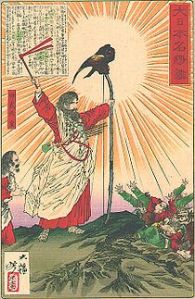February 11

It’s hard to say what’s the oldest country in the world is, but the winner might be Japan twice over.
First, with an average lifespan of over 80 years Japan has one of, if not the, world’s oldest population. 25% of the population is over 60 (as opposed to 17% in the U.S.). So, along with Andorra, Japan is one of the top two “oldest” countries in the world in that respect.
In terms of the oldest sovereign nation without major border changes, many people cite the tiny country of San Marino, which declared itself a constitutional republic in 301 AD. Founded by a Christian stonemason (Marinus of Rab) fleeing persecution, San Marino lies entirely within Italy.

But a thousand years before Marinus the Mason drew his first breath, Emperor Jinmu (also Jimmu) founded the nation of Japan, making it the oldest nation in the world by many accounts.
How much of Jinmu’s story is true and how much is legend will never be known. His name means “divine warrior” and for millennia the Japanese believe Jinmu descended from the Sun Goddess through her “Heavenly Grandchild”. The Sun Goddess dispatched her Grandson to Earth with the imperative:
“This Reed-plain-1500-autumns-fair-rice-ear Land is the region which my descendants shall be lords of. Do thou, my August Grandchild, proceed thither and govern it. Go! and may prosperity attend thy dynasty, and may it, like Heaven and Earth, endure forever.”
Japanese schoolchildren learned the above declaration by heart right up through World War II.
During Japan’s modernization in the 1870’s, the Meija government (Meija means “enlightened rule”) switched the country over to the solar calendar, and calculated the date of the founding as February 11, 660 BC. Kenkoku Kinen no hi (National Foundation Day) celebrated the country’s unification 2500 years earlier and the divinity of the Emperor.
During the American Occupation, celebration of Kenkoku Kinen no hi was banned because of its glorification of the Emperor. However the ceremonies were brought back by popular demand in 1966 and carry on strong today.
Though the Japanese may no longer believe the Emperor’s blood descends from the Sun, even to this day the red sun shines front and center as the proud symbol of the Japanese flag.


There is another country that should be considered.
Ethiopia is about 3 thousand years old, and never really lost its independance. Italians did occupy it for less than ten years, leaving after being vainquished by the very ruler they had deposed in the first place.
It also likely that men as specie appeared in the ethiopian rift.
You forgot about Armenia.. Armenia is one of the oldest countries in the world… if not THE OLDEST… you should write a article about Armenia..
If the oldest cities in the world are Damascus in Syria, Jericho and Yafa in Palestine, Bublos and Sidon in Lebanon, Medinat Al-Fayoum in Egypt,Gaziantep in Turkey, So according to you what are the oldest countries in the world?
It was Actually Turkey (where the garden of Eden is situated) Read the Bible (Genesis-Exodus)
Are you forgetting something called Mesopotamia?
5100 years ago my Aramian grandpa wrote something
what Japan are you talking about?
http://en.wikipedia.org/wiki/Mesopotamia
Upper mespotamia which is north of iraq / south of turkey is the oldest by far
I should clarify, I’m referring to countries or nations, not civilizations. Japan’s borders have remained virtually unchanged for thousands of years, as has—at least in legend—its imperial lineage, whereas the borders and governments of the other civilizations mentioned have changed numerous times in the ensuing years.
Saying one nation is older than the other simply based on borders is a highly debatable method of measurement, if not a bit subjective. Being able to simply say “I kept my borders intact, ergo I am older than you” has no bearing on the age of a nation. The nation was San Marino has the worlds oldest constitution in effect ergo it would be the birthplace of democracy correct? By your reasoning it would be. We do know however this is not the case. Nation states are just like people, they are influenced by their neighbors and they in turn influence their neighbors, both directly and indirectly. I have to vote for Armenia as well based on the following points. The Armenian people and nation have bee in continued existence (in the Armenian Highland, which includes Mt. Ararat, the legendary resting site of the Biblical Noah’s Ark) since the Bronze Age, around 4000BC. Since that time though their borders have shrunk, they remained an independent state and flourished. Even under the rule of the Byzantine, Ottoman empires as well as the USSR, their nation was an independent country within the empire, and their people remained mostly within their homeland. Their borders were shrunk as a result of being robbed and genocided during the 1915 genocide. The worlds oldest winery as well as shoe were recently found in Armenia (Areni 1). Many proto-human sites as well. Armenia was the 1st Christian nation on earth. Their language predates every since western language and their written language was founded in the 400’s. Their culture is unique, entirely. They influenced their neighbors, unlike Japan which was influenced HEAVILY by the Chinese, whether it be their language, religion, food, music etc etc. Armenians are racially, linguistically, nationalistically, culturally and religious completely different than all their neighbors. They predate almost all of Europe and are considered to be the birthplace of the Caucasian peoples of this world. While your article was well written (good job BTW) I must say that saying Japan is the worlds oldest nation, twice over, is simply a technicality, but anyone can point out technicalities if you define the parameters. Objectively one thing is clear, the Armenians were around just as long as the Japanese, and as far as Europeans/Caucasians are concerned, it seems that we are starting to realize, the further we keep looking back, the further they seem exist.